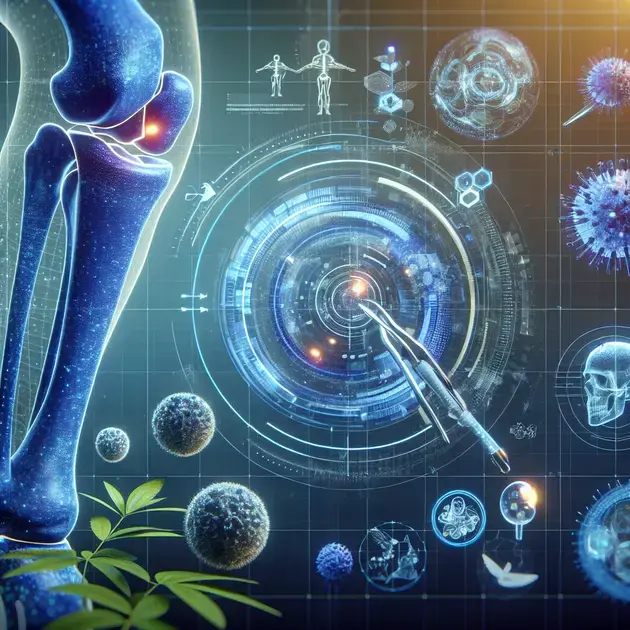If you’ve ever experienced a popping sensation in your knee, you’re not alone. This common issue can be concerning, but with a bit of knowledge and understanding, you can better manage it. In this article, we’ll delve into the causes and treatment options for the popping sensation in your knee.
Recent studies have shown that the popping sensation in the knee can be attributed to various factors, including ligament or meniscus injuries, muscle imbalances, or even something as simple as air bubbles within the joint. Understanding the root cause of the popping can help guide you towards the most effective treatment for long-term relief.

Causes of Knee Popping
When it comes to understanding the causes of knee popping, it’s essential to consider various factors that may contribute to this sensation. One common reason for knee popping is the presence of air or gas bubbles in the synovial fluid surrounding the knee joint. These bubbles can cause a popping or cracking sound when they are released as the knee joint moves.
Another possible cause of knee popping is the misalignment of the patella, also known as the kneecap. If the patella does not track properly within the groove of the femur, it can produce a popping sensation during movement. Additionally, issues with the cartilage or ligaments in the knee joint can also lead to popping noises.
To address the causes of knee popping, it’s important to consult with a healthcare professional, such as a physical therapist or orthopedic specialist. They can conduct a thorough evaluation of your knee joint to identify the underlying issues contributing to the popping sensation. Treatment options may vary depending on the specific cause of the knee popping.
One helpful app for tracking and managing knee pain is “My Knee Guide,” which provides information on knee anatomy, conditions, treatments, and exercises. This app can help you better understand the factors contributing to your knee popping and guide you towards appropriate treatment options.
By addressing the root causes of knee popping through targeted treatments and exercises, you can effectively manage this sensation and improve the overall health of your knee joint.
Treatment Options for Popping Sensation
When experiencing a popping sensation in the knee, it’s crucial to explore various treatment options to alleviate discomfort and prevent further issues. One common approach to managing knee popping is through physical therapy, which can help improve knee alignment, strength, and flexibility to reduce popping noises.
In some cases, using knee braces or taping techniques can provide additional support and stability to the knee joint, reducing the likelihood of popping sensations during movement. These devices can help align the patella correctly and minimize friction within the joint.
Another effective treatment option for knee popping is to incorporate low-impact exercises, such as cycling or swimming, into your fitness routine. These activities can help strengthen the muscles surrounding the knee joint without placing excessive stress on the joint itself.
For individuals experiencing persistent knee popping due to underlying structural issues, surgical interventions may be considered as a last resort. Procedures such as arthroscopic surgery can address cartilage or ligament abnormalities within the knee joint, thus reducing popping sensations.
An excellent resource for exploring different treatment options for knee popping is the website of the American Academy of Orthopaedic Surgeons (AAOS), which offers comprehensive information on knee conditions and treatment approaches. By consulting reliable sources like the AAOS website, you can make informed decisions about managing knee popping effectively.
Understanding the Root Cause
Understanding the root cause of knee popping is essential for developing an appropriate treatment plan and preventing future issues. By conducting a thorough evaluation of your knee joint, healthcare professionals can pinpoint the specific factors contributing to the popping sensation.
Factors such as muscle imbalances, joint misalignments, or previous injuries can all play a role in causing knee popping. By addressing these underlying issues through targeted interventions, such as physical therapy or corrective exercises, you can address the root cause of the popping sensation.
In some cases, lifestyle modifications, such as maintaining a healthy weight and avoiding high-impact activities, may also help reduce the frequency of knee popping. By taking proactive steps to support the health of your knee joint, you can minimize the risk of experiencing popping sensations during daily activities.
It’s essential to work closely with healthcare professionals to accurately diagnose the root cause of knee popping and develop a personalized treatment plan. By collaborating with experts in orthopedic care, you can effectively address the underlying factors contributing to the popping sensation and improve the overall function of your knee joint.
By gaining a deeper understanding of the root cause of knee popping and implementing targeted treatment strategies, you can effectively manage this sensation and maintain the long-term health of your knee joint.

Common Causes of Knee Popping
When it comes to knee popping, several common causes can lead to this sensation. One of the primary reasons for knee popping is the presence of air bubbles in the synovial fluid around the knee joint. These air bubbles can create a popping or cracking sound when they are released as the knee moves. Additionally, issues with the knee’s ligaments or tendons, such as tightness or inflammation, can also contribute to the popping sensation. Furthermore, conditions like meniscus tears or arthritis can cause irregular movements within the knee joint, leading to popping.
Another common cause of knee popping is patellofemoral pain syndrome, which occurs when the kneecap rubs against the thigh bone, causing discomfort and audible popping noises. Weakness or imbalance in the muscles surrounding the knee joint can also result in abnormal movements and popping sounds. It’s essential to identify the specific cause of knee popping to determine the appropriate treatment and prevent further complications.
To address knee popping, it is crucial to consult with a healthcare professional for a proper diagnosis. Through a physical examination and possibly imaging tests like X-rays or MRIs, the healthcare provider can pinpoint the underlying cause of the popping sensation. Based on the diagnosis, treatment options such as physical therapy, medication, or even surgery may be recommended to address the issue and alleviate the knee popping.
Engaging in regular exercise routines that focus on strengthening the muscles around the knee joint can help improve stability and reduce popping sounds. Stretching exercises to enhance flexibility and mobility in the knee can also be beneficial in managing knee popping. Using supportive devices like knee braces or orthotics may provide additional stability and reduce excessive movements that contribute to the popping sensation.
In some cases, lifestyle modifications such as maintaining a healthy weight to reduce stress on the knee joint or avoiding activities that exacerbate the popping sound can help manage the condition. By addressing the common causes of knee popping and implementing effective treatment strategies, individuals can experience improved knee health and enhanced overall mobility.
Effective Treatments for Popping Sensation
Exploring various effective treatments for the popping sensation in the knees can help individuals find relief and improve their quality of life. One treatment option that is often recommended for knee popping is physical therapy. A physical therapist can create a customized exercise regimen to strengthen the muscles around the knee joint and improve stability, reducing the occurrence of popping sounds.
Another effective treatment for knee popping is the use of nonsteroidal anti-inflammatory drugs (NSAIDs) to alleviate pain and reduce inflammation in the knee joint. These medications can help manage discomfort associated with knee popping and support overall joint health. In more severe cases, corticosteroid injections may be administered to decrease inflammation and provide temporary relief from the popping sensation.
For individuals experiencing persistent knee popping, surgical interventions such as arthroscopic surgery may be considered to address underlying issues within the knee joint. This minimally invasive procedure allows surgeons to evaluate and repair damaged structures in the knee, reducing the likelihood of continued popping sounds. Physical therapy following surgery can further aid in rehabilitation and restoring optimal knee function.
Additionally, incorporating lifestyle modifications like maintaining a balanced diet rich in nutrients that support joint health and engaging in low-impact exercises can complement traditional treatments for knee popping. Weight management plays a crucial role in reducing stress on the knee joint and minimizing discomfort associated with popping sensations. Using supportive devices like knee braces or shoe inserts can also provide additional support and stability during physical activities.
It is essential to work closely with healthcare professionals to determine the most appropriate treatment approach for addressing knee popping. By exploring effective treatments that target the underlying causes of the popping sensation, individuals can experience improved joint function, reduced pain, and enhanced overall mobility.
Exploring the Underlying Issue
Delving into the underlying issues that contribute to knee popping can provide valuable insights into the root causes of this common sensation. One key aspect to consider when exploring the underlying problem is the biomechanics of the knee joint. Irregularities in the alignment or movement patterns of the knee can lead to abnormal sounds like popping or cracking during physical activities.
Furthermore, assessing the condition of the knee structures such as the ligaments, tendons, and cartilage can reveal any abnormalities or damage that may be responsible for the popping sensation. Injuries like meniscus tears or ligament sprains can disrupt the smooth movement of the knee joint, resulting in audible popping noises. Understanding the specific anatomical issues within the knee is crucial for developing an effective treatment plan.
In some cases, underlying conditions like arthritis or patellar tracking disorder may be the underlying cause of knee popping. These conditions can affect the stability and function of the knee joint, leading to discomfort and audible sounds during movement. Identifying and addressing these underlying issues through proper diagnosis and targeted treatments is essential for managing knee popping effectively.
Certain lifestyle factors such as overuse injuries, repetitive movements, or sudden changes in physical activity levels can also contribute to the development of knee popping. By examining daily habits and activity levels, individuals can identify potential triggers for the popping sensation and make necessary adjustments to reduce strain on the knee joint. Implementing preventive measures and maintaining good knee health can play a significant role in preventing or minimizing knee popping in the long term.
Exploring the underlying issues related to knee popping requires a comprehensive evaluation of the joint structures, movement patterns, and contributing factors. By addressing the root causes of the popping sensation and implementing targeted treatment approaches, individuals can effectively manage knee popping and improve their overall joint function and mobility.
Conclusion
Understanding the common causes of knee popping is crucial in addressing this sensation effectively. From air bubbles in the synovial fluid to issues with ligaments or tendons, various factors contribute to the popping sound. Identifying the specific cause is key to determining the appropriate treatment, whether it’s physical therapy, medication, or surgery.
Exploring effective treatments such as physical therapy, NSAIDs, or surgical interventions can provide relief and improve joint health. Lifestyle modifications like maintaining a balanced diet and engaging in low-impact exercises complement traditional treatments for knee popping. Working closely with healthcare professionals is essential for a tailored treatment approach that targets the root causes of knee popping.
Delving into the biomechanics of the knee joint and assessing its structures can reveal underlying issues that lead to popping sensations. From arthritis to overuse injuries, understanding these factors helps in developing an effective treatment plan. By addressing the root causes, individuals can manage knee popping, improve joint function, and enhance overall mobility for long-term knee health.